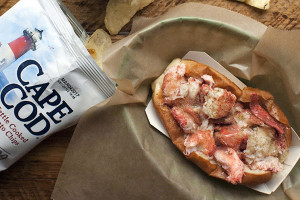Dining Out: Club Med
Declaration of partiality: I adore Ana Sortun and her adventurous, exotic, solidly grounded food. So I couldn't wait for her to open her own restaurant, Oleana, in the old Daddy-O's space in Cambridge, which she did just after New Year's. I'm jumping the gun slightly in reviewing it and can only assume that the numerous glitches in service and several in food I found on my early visits will work themselves out. Let's just say I'm sure the food will very soon come up to the standards Sortun set for herself at Casablanca, where she made the bar menu the most adventurous, reliable, and satisfying of anywhere in Boston or Cambridge (and which looks set to stay terrific in the capable hands of Ruth-Anne Adams). And I'll be more than happy to wait until Oleana fulfills the very ambitious expectations Sortun has set for herself in her first venture as chef and co-owner.
The name Oleana is all hers—all of her official first name, that is; it means “paradise” or “promised land,” reflecting her solid Scandinavian heritage on both sides—but she's not in this alone. Her co-owner, Gary Griffin, a long-time Casablanca veteran who ran the bar for five years (preparation to run most anything, I would imagine), helped her and their friends roll up their sleeves and renovate. The one thing left untouched, wisely, is the large and lovely garden, one of the nicest outdoor dining spaces in the city. This will be a place to come for long, leisurely drinks and desserts on summer evenings that take their sweet time turning to dusk.
I'm sneakily saying that desserts, along with appetizers, are the strong suits of the opening menu. And the bar tables—well, you've got to go to the restaurant to see them. You'll probably want to ask Griffin to create one or two for you. They're made of flattened stones set into grout and varnished to make a beautiful, flat pattern in bronze and black. The square dining tables are also handmade, by Griffin, of golden onyx (a stone I had never seen) with glints of honey. They're the nicest part of the décor, which is otherwise very clean, with a long, light-finished oval wooden table by the windows—good for big groups—and blond hardwood floors. One wall is half open kitchen, half slate wall, with a cast-iron wood stove.
Everything on the “ready-to-eat” menu is sure-fire—and cheap too. Sortun has a kind of genius for little plates of perfectly wonderful things that make you want to eat and especially drink more. They function like tapas, but the inspiration isn't necessarily Spanish or Mediterranean. Armenian bean and walnut pâté with homemade string cheese ($4), for instance, is a thick bean-walnut paste spiced with a dried tarragon-basil mixture from an Armenian tea merchant Sortun befriended when he was here to consolidate an arrangement to sell his teas in America. (She's so in love with his spices and herbs that she wants to start selling blends of them herself.) There's a strong hit of fresh garlic too. I also see a big future for the string cheese, which is like strands of dry and rather salty, mozzarella-like, unsauced spaghetti and fun to pick up with your hands.
When's the last time you saw deviled eggs on a menu? Served with tuna and black olives to the side ($3), this dish provides another childish pleasure with adult flavors; if you mix everything up you get your own tapenade. Ask for as much of the white bread as you can get: Sortun persuaded a Portuguese baker to sell the restaurant her mysteriously layered bread, soft and airy but not flaccid, with a leaflike crust. It's a wonder. The wine list has been chosen to be both unusual and moderately priced. I was very glad to find a thick-textured white Aglianico from a house I didn't know, Solopaca ($35), which went very well with the first courses. There are almost no big-name vintners on the list, but the prices were reasonable enough to warrant experimentation.
The appetizers start to get complicated, and several have enough components for a meal (clams cataplana with sausage, tomato, and boiled potato [$9], for example). I'm very pleased to see a version of the sweet-spiced braised short ribs from Casablanca, in this guise shredded and pan-fried as a gallette, with baby greens and a carrot-mustard vinaigrette ($8). It's crisp on the outside and very soft inside. The warm beet and lentil salad with fried goat cheese ($8) consists of lightly dressed firm little Puy lentils with pretty slices of carrot, molded in a tall disk. The standout will doubtless be off the menu as the weather warms: chestnut soup with slivers of serrano ham and lots of sherry ($6). Here's where Sortun is at her most impressive, extracting flavor and richness from just a few simple ingredients. I hope she will simplify many of the other items to this balance.
Main courses were more successful in individual components than as wholes. Best overall was grilled lamb steak with Turkish spices and fava bean moussaka ($19), another recipe Sortun took from a native cook—this time in the southeastern part of Turkey, where she learned dishes firsthand and acquired a sense of spicing that is by turns subtle and bold. The lamb is marinated overnight, she told me, in a red-pepper rub, along with dried mint from her Armenian merchant friend. The moussaka has other typical Turkish ingredients, such as a thick and deep-flavored tomato paste, cinnamon, and more of that mint. It's an opulent dish. Another success is monkfish stuffed with a fresh-tasting, smooth artichoke purée, and topped with a sweet fig, fennel, and wine sauce ($21); there was the sweet-sour surprise of confit of lemon in the package.
Other vegetables and sauces were not as suited to their star ingredients, and one dish didn't work at all: almond fried chicken ($17), which Sortun told me she double-dredged in almond flour and herbes de Provence to get a thick and crunchy crust. Too thick, I thought, and the chicken, at one dinner, was disastrously underdone. Worse, the server greeted this news, which had been diplomatically delivered, sullenly and made my guest feel somehow ashamed and responsible while she waited to get back her main course and watched everyone else eat. As the main course was being cleared around the table, a small plate of very charred chicken was plunked down in front of her, with cold semi-finished side dishes. And it appeared on the bill. More staff members and more training would seem to be the next order to put in.
Such smoothing out, and Sortun's increasing focus and confidence, are worth waiting for. And Oleana puts not one but two great chefs at nightly disposal: Sortun and Maureen Kilpatrick, who masterminded the pastries at Hi-Rise Bread Company, and who does splendid ice creams and sorbets. I couldn't get enough tangerine granita, piled in a parfait glass with a caramel bavarian. My own favorite was “palace bread,” which is simply chunks of crustless bread cooked in rose water-scented syrup until it becomes chewy and caramelized ($7). It makes bread pudding look like a soggy, pathetic also-ran.
The showstopper is the baked Alaska, on a chewy coconut macaroon with great coconut ice cream and passion fruit caramel ($8). Kilpatrick sprinkles sugar over the pointed puffs of meringue and makes the whole thing as big as a softball, festively browned and tasting of toasted marshmallow. It merits a whispered request to the kitchen to put a candle in it, whatever the occasion.

